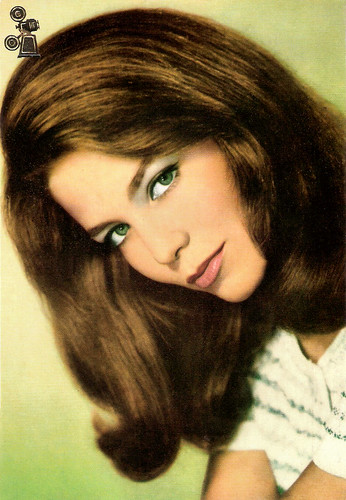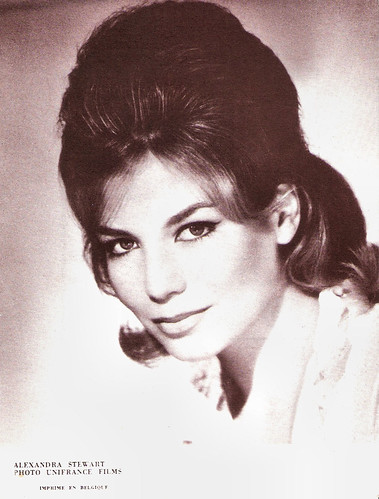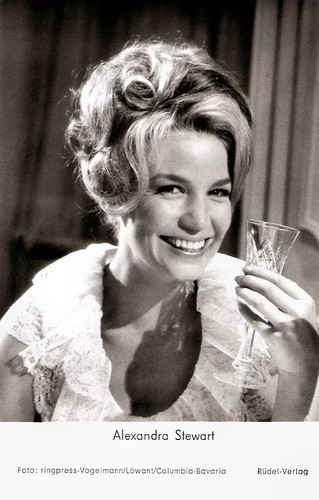Canadian actress Alexandra Stewart (1939) started her film career in the French comedy Les Motards (1958), and has since then enjoyed a steady career in both French- and English-language films. Among her best films are some classics by Nouvelle Vague directors Louis Malle and François Truffaut.

Spanish postcard by Torro de Bronce, no. 153, 1964. Photo: Sam Lévin.
Alexandra Stewart was born in Montreal, Quebec, in 1939. In 1957, she arrived in Paris, France, to study art. She earned a living with modelling and working as an extra in films.
Within a year, she made her official film debut in the comedy Les Motards/The Motorcycle Cops (Jean Laviron, 1958) starring Roger Pierre and Jean-Marc Thibault. She then appeared in Le Bel Age (Pierre Kast, 1960). Kast introduced her to the directors of the Nouvelle Vague. She appeared in the Nouvelle Vague film L'eau à la bouche/A Game for Six Lovers (Jacques Doniol-Valcroze, 1960), and opposite Jean-Paul Belmondo in Les distractions/Trapped by Fear (Jacques Dupont, 1960).
In England she played a supporting part in Tarzan the Magnificent (Robert Day, 1960) with Gordon Scott in his last appearance as Tarzan. That year she also had a supporting part in Exodus (Otto Preminger, 1960), the epic on the reclamation of Israel. She then was a murder victim in the Georges Siménon adaptation La mort de Belle/The End of Belle (Édouard Molinaro 1961), and she played at the side of Simone Signoret in the psychological drama Les Mauvais Coups/Naked Autumn (François Leterrier, 1961).
One of her best films is the Nouvelle Vague drama Le feu follet/The Fire Within (Louis Malle, 1963), with Maurice Ronet and Jeanne Moreau. Nathan Southern at AllMovie: “this feature contains one of the most dynamic aural-visual couplings in modern film. The stark, hi-con black-and-white cinematography and the Erik Satie music -- each perfectly evocative by itself -- not only accentuate but complete each other, and form an impeccable accessory to the thematic nihilism of the piece. In fact, Malle's aesthetic evocation of psychodrama was so groundbreaking at the time that it made a permanent stylistic impact on many less-inspired cinematic explorations of behavioral dysfunction -- such as Lady in a Cage, Séance on a Wet Afternoon, and Mickey One (which, not coincidentally, was also lensed by Ghislain Cloquet). Malle's narrative architecture is equally brilliant -- he structures the work like a piece of classical music, rich with recurrences and variations.”
Years later, Stewart and director Malle later would become a couple. In 1983 she also worked with Jean-Luc Godard on his segment of the anthology film Ro.Go.Pa.G. (1963). Stewart worked in France, Germany, Italy as well as in the US, where she starred opposite Warren Beatty in the here before mentioned Mickey One (Arthur Penn, 1965). Remarkable was also the Italian-French comedy Marcia nuziale/The Wedding March (Marco Ferreri, 1966), with Ugo Tognazzi.
Back in France, she played in the revenge film La Mariée était en noir/The Bride Wore Black (François Truffaut, 1968), featuring Jeanne Moreau. She also played the leading role in the Dutch thriller Bezeten – Het gat in de muur/Obsessions (Pim de la Parra, 1969), which was co-written by the young Martin Scorsese. Besides her cinema career, Alexandra Stewart regularly appeared in popular TV series, such as Danger Man (1965) and The Saint (1966). A huge success in France was the series L'Homme qui revient de loin/The Man who returned from far (Michel Wyn, 1974). Later she was seen in the Mini-series Mistral's Daughter (1984) and Sins (1986).

Belgian promotion card for Cine Rio, Coxyde. Photo: Unifrance Films.

German postcard by Rüdel-Verlag, Hamburg-Bergedorf, no. 3972. Photo: Ringpress / Vogelmann / Löwant Columbia Bavaria. Publicity still for ...e la donna creò l'uomo/Full Hearts and Empty Pockets (Camillo Mastrocinque, 1964).
Alexandra Stewart was among the ensemble cast of the World War I action-drama Zeppelin (Étienne Périer, 1971), about a fictitious German attempt to raid on Great Britain in a giant Zeppelin to steal the Magna Carta from its hiding place in one of Scotland's castles.
Also amusing is the Dutch-Belgian thriller Because of the Cats (Fons Rademakers, 1973) starring Bryan Marshall and Sylvia Kristel in one of her first roles.
One of her best French films is La Nuit américaine/Day for Night (François Truffaut, 1973) with Jacqueline Bisset and Jean-Pierre Léaud. It chronicles the problematic production of a clichéd melodrama and the romances, affairs, break-ups, and sorrows on the set. The film is often considered one of Truffaut's greatest films and won the Oscar for Best Foreign Film in 1974.
Another highlight in her cooperation with Louis Malle is the underrated apocalyptic fantasy Black Moon (Louis Malle, 1975) with Cathryn Harrison (granddaughter of Rex). James Travers at Le Film Guide: “Black Moon is one of the few truly experimental films to have been made since WW II, a bizarre free-flowing expressionist fantasy which evolkes the early work of Jean Cocteau and Luis Bunuel.”
Stewart could also be seen in the softcore erotica of Goodbye Emmanuelle (François Leterrier, 1977), starring Sylvia Kristel. She was also one of the older women in the life of Tom Berenger in In Praise of Older Women (George Kaczender, 1978), and was in the cast of the sexploitation Madame Claude 2 (François Mimet, 1981).
In between she worked with director John Huston on Phobia (1980) and with Claude Lelouch on Les Uns et les autres (1981). Supporting parts in interesting films kept coming her way, such as in Le sang des autres/The Blood of Others (Claude Chabrol, 1984) with Jodie Foster, and the excellent thriller Frantic (Roman Polanski, 1987), starring Harrison Ford. She also worked with the French director Eric Rohmer on Les Jeux de société (1989).
In the following decades her film career slowed down, but her later films include François Ozon’s masterpiece Sous le sable/Under the Sand (François Ozon, 2000), starring Charlotte Rampling, and the comedy-mystery Mon petit doigt m'a dit... /By the Pricking of My Thumbs (Pascal Thomas, 2004) based on a novel by Agatha Christie. Since then she made French, Spanish and Italian films and most recently she played in the American production Armenia Commedia (Anna Condo 2016). In 2014, she published a memoir, Mon bel âge (My beautiful age).
Alexandra Stewart has a daughter, Justine Malle (1974), with Louis Malle.
French trailer Le feu follet/The Fire Within (1963). Source: TV5 Monde (YouTube).
Theatrical trailer Mickey One (1965). Source: modcinema.com (YouTube).
Sources: Nathan Southern (AllMovie), James Travers (Le Film Guide), Alexandra Schwartzbrod (Liberation - French), Wikipedia and IMDb.

Spanish postcard by Torro de Bronce, no. 153, 1964. Photo: Sam Lévin.
Nouvelle Vague
Alexandra Stewart was born in Montreal, Quebec, in 1939. In 1957, she arrived in Paris, France, to study art. She earned a living with modelling and working as an extra in films.
Within a year, she made her official film debut in the comedy Les Motards/The Motorcycle Cops (Jean Laviron, 1958) starring Roger Pierre and Jean-Marc Thibault. She then appeared in Le Bel Age (Pierre Kast, 1960). Kast introduced her to the directors of the Nouvelle Vague. She appeared in the Nouvelle Vague film L'eau à la bouche/A Game for Six Lovers (Jacques Doniol-Valcroze, 1960), and opposite Jean-Paul Belmondo in Les distractions/Trapped by Fear (Jacques Dupont, 1960).
In England she played a supporting part in Tarzan the Magnificent (Robert Day, 1960) with Gordon Scott in his last appearance as Tarzan. That year she also had a supporting part in Exodus (Otto Preminger, 1960), the epic on the reclamation of Israel. She then was a murder victim in the Georges Siménon adaptation La mort de Belle/The End of Belle (Édouard Molinaro 1961), and she played at the side of Simone Signoret in the psychological drama Les Mauvais Coups/Naked Autumn (François Leterrier, 1961).
One of her best films is the Nouvelle Vague drama Le feu follet/The Fire Within (Louis Malle, 1963), with Maurice Ronet and Jeanne Moreau. Nathan Southern at AllMovie: “this feature contains one of the most dynamic aural-visual couplings in modern film. The stark, hi-con black-and-white cinematography and the Erik Satie music -- each perfectly evocative by itself -- not only accentuate but complete each other, and form an impeccable accessory to the thematic nihilism of the piece. In fact, Malle's aesthetic evocation of psychodrama was so groundbreaking at the time that it made a permanent stylistic impact on many less-inspired cinematic explorations of behavioral dysfunction -- such as Lady in a Cage, Séance on a Wet Afternoon, and Mickey One (which, not coincidentally, was also lensed by Ghislain Cloquet). Malle's narrative architecture is equally brilliant -- he structures the work like a piece of classical music, rich with recurrences and variations.”
Years later, Stewart and director Malle later would become a couple. In 1983 she also worked with Jean-Luc Godard on his segment of the anthology film Ro.Go.Pa.G. (1963). Stewart worked in France, Germany, Italy as well as in the US, where she starred opposite Warren Beatty in the here before mentioned Mickey One (Arthur Penn, 1965). Remarkable was also the Italian-French comedy Marcia nuziale/The Wedding March (Marco Ferreri, 1966), with Ugo Tognazzi.
Back in France, she played in the revenge film La Mariée était en noir/The Bride Wore Black (François Truffaut, 1968), featuring Jeanne Moreau. She also played the leading role in the Dutch thriller Bezeten – Het gat in de muur/Obsessions (Pim de la Parra, 1969), which was co-written by the young Martin Scorsese. Besides her cinema career, Alexandra Stewart regularly appeared in popular TV series, such as Danger Man (1965) and The Saint (1966). A huge success in France was the series L'Homme qui revient de loin/The Man who returned from far (Michel Wyn, 1974). Later she was seen in the Mini-series Mistral's Daughter (1984) and Sins (1986).

Belgian promotion card for Cine Rio, Coxyde. Photo: Unifrance Films.

German postcard by Rüdel-Verlag, Hamburg-Bergedorf, no. 3972. Photo: Ringpress / Vogelmann / Löwant Columbia Bavaria. Publicity still for ...e la donna creò l'uomo/Full Hearts and Empty Pockets (Camillo Mastrocinque, 1964).
Underrated apocalyptic fantasy
Alexandra Stewart was among the ensemble cast of the World War I action-drama Zeppelin (Étienne Périer, 1971), about a fictitious German attempt to raid on Great Britain in a giant Zeppelin to steal the Magna Carta from its hiding place in one of Scotland's castles.
Also amusing is the Dutch-Belgian thriller Because of the Cats (Fons Rademakers, 1973) starring Bryan Marshall and Sylvia Kristel in one of her first roles.
One of her best French films is La Nuit américaine/Day for Night (François Truffaut, 1973) with Jacqueline Bisset and Jean-Pierre Léaud. It chronicles the problematic production of a clichéd melodrama and the romances, affairs, break-ups, and sorrows on the set. The film is often considered one of Truffaut's greatest films and won the Oscar for Best Foreign Film in 1974.
Another highlight in her cooperation with Louis Malle is the underrated apocalyptic fantasy Black Moon (Louis Malle, 1975) with Cathryn Harrison (granddaughter of Rex). James Travers at Le Film Guide: “Black Moon is one of the few truly experimental films to have been made since WW II, a bizarre free-flowing expressionist fantasy which evolkes the early work of Jean Cocteau and Luis Bunuel.”
Stewart could also be seen in the softcore erotica of Goodbye Emmanuelle (François Leterrier, 1977), starring Sylvia Kristel. She was also one of the older women in the life of Tom Berenger in In Praise of Older Women (George Kaczender, 1978), and was in the cast of the sexploitation Madame Claude 2 (François Mimet, 1981).
In between she worked with director John Huston on Phobia (1980) and with Claude Lelouch on Les Uns et les autres (1981). Supporting parts in interesting films kept coming her way, such as in Le sang des autres/The Blood of Others (Claude Chabrol, 1984) with Jodie Foster, and the excellent thriller Frantic (Roman Polanski, 1987), starring Harrison Ford. She also worked with the French director Eric Rohmer on Les Jeux de société (1989).
In the following decades her film career slowed down, but her later films include François Ozon’s masterpiece Sous le sable/Under the Sand (François Ozon, 2000), starring Charlotte Rampling, and the comedy-mystery Mon petit doigt m'a dit... /By the Pricking of My Thumbs (Pascal Thomas, 2004) based on a novel by Agatha Christie. Since then she made French, Spanish and Italian films and most recently she played in the American production Armenia Commedia (Anna Condo 2016). In 2014, she published a memoir, Mon bel âge (My beautiful age).
Alexandra Stewart has a daughter, Justine Malle (1974), with Louis Malle.
French trailer Le feu follet/The Fire Within (1963). Source: TV5 Monde (YouTube).
Theatrical trailer Mickey One (1965). Source: modcinema.com (YouTube).
Sources: Nathan Southern (AllMovie), James Travers (Le Film Guide), Alexandra Schwartzbrod (Liberation - French), Wikipedia and IMDb.
1 comment:
exelent actres.
Post a Comment